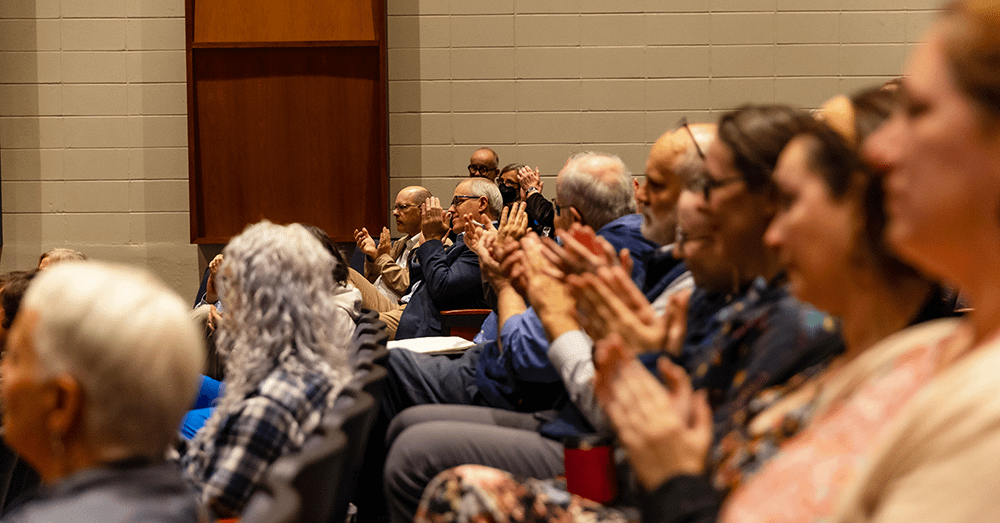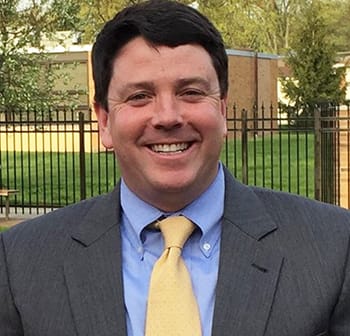Speaker explores notion of holy welcome for all in his Jewish tradition
Steven Greenberg, the first openly gay Orthodox rabbi, offers annual Max Wall lecture, sharing thought-provoking personal experiences and insights
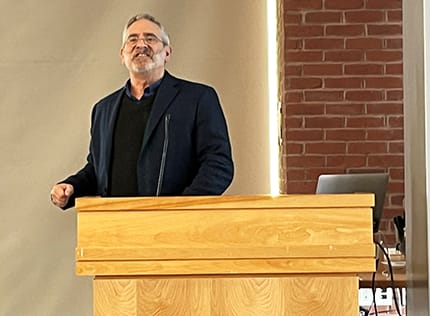
Rabbi Steven Greenberg speaks in the Roy Room Wednesday afternoon. (photo by Brother Tom Berube, S.S.E., large photo behind headline by Allison Croce ’20)
“A wonderful lecture on the importance of welcoming all people” is how Saint Michael’s President Lorraine Sterritt summed up Wednesday’s annual Rabbi Max Wall Lecture by Rabbi Steven Greenberg, whose topic was “A Decade of Conflict and Convergence: LGBTQ lives in Orthodox Jewish Contexts.”
In a well-received and thought-provoking late-afternoon talk in the Dion Center Roy Room to about 75 people, Greenberg described his personal journey to becoming the first openly gay Orthodox rabbi, examining Biblical texts, social conventions, hurtful or cruel mindsets, and challenging or changing understandings of human sexuality in his and other traditions.
The first introductory speaker for the lecture was Jeffrey Trumbower, Saint Michael’s vice president for academic affairs, who gave the history of this annual lecture, observing that Rabbi Wall’s daughters, Mindy Evnin and Shira Antonoff, were in the audience as in many years past. This annual lecture honors the memory of Rabbi Max Wall (1915-2009), long-time rabbi of Burlington’s Ohavi Zedek synagogue and part-time professor at Saint Michael’s College, Trumbower said in welcoming that congregation’s present leader, Rabbi Amy Small, who also offered introductory words.
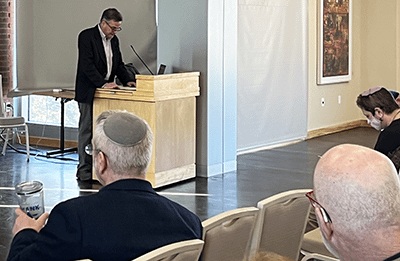
Jeffrey Trumbower does introductions. Rabbi Amy Small sits at right. (photo by Allison Croce ’20)
Besides being the spiritual leader at Ohavi Zedek for decades, Rabbi Wall took groundbreaking initiative in the early 1960s to forge a lasting relationship with Saint Michael’s College, including teaching courses, initiating a Judaica collection in the library and establishing this lecture series, Trumbower said. Attendees Wednesday included a large group from the area Jewish community along with Saint Michael’s students, faculty and staff along with President Sterritt.
Greenberg opened by saying how he was happy to introduce himself “as an oxymoron” – that is, an openly gay Orthodox rabbi. He quoted a thought from one of his earlier writings, to the effect of asking what one is to do when “cultures don’t give you the spaces you need and you don’t know how to create those spaces?” He said at the place where he studied to become a rabbi — the rabbinical seminary of Yeshiva University — there was “no such thing as a gay Orthodox rabbi,” adding that at the time it would be like saying, “you can eat cheeseburgers on Yom Kippur.”
When he came out of the closet, he said, many told him, “Great, now you don’t have to be Orthodox.” Yet he felt strongly about retaining his place in the community that he felt most part of, even though he knew the path was fraught. At that time, one in his situation was typically “either silent and stayed, or spoke up and left,” but Greenberg spoke up and stayed, and now feels proud that since then, “hundreds of thousands of Orthodox Jews are entertaining and sometimes deciding to remain Orthodox Jews and pushing communities to do better.”
Greenberg went on to frame his talk, in a spirit of openness or humility, he said, around “welcoming the stranger in physical ways” and “welcoming what is strange” in perhaps emotional, spiritual or cultural ways based on longstanding traditions and inherited understandings.
That led to his account of some absorbing and harrowing family history – his mother’s experiences in France as a child in World War II hiding from Nazis — with many Catholic French families and nuns in convents and orphanages essentially saving his mom and many hundreds of other Jewish children, while many other family members were deported and murdered.
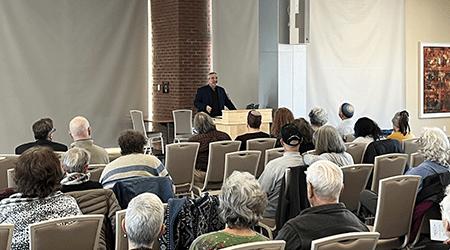
Turnout was strong as usual for the Rabbi Max Wall lecture (Photo by Allison Croce ’20)
His mom eventually was able to come to the U.S. as an orphan living with extended family here, and in time met his father who became her protector in high school. As a typical teen, he once had a fight with his mom and decided to go to an Orthodox synagogue although they were conservative, and he met a rabbi who noticed him, invited him to Shabbat lunch and insisted they study together. Soon he brought his friends, and all were dazzled by learning Talmud. “I sometimes say I became Orthodox because I was welcomed into TWO communities – vertical and horizontal,” he said. To Greenberg, vertical means “around the table with Moses, the prophets, early rabbis” and his friends, all “trying to figure out what it means to live a good life”; and then “horizontally” with endless invitations to dinners that formed warm social affinities within the Orthodox tradition with individuals he came to love and respect.
“My Queer story makes no sense if you don’t understand my Jewish story,” he said. “I was swept away to belong to a narrative, intellectual tradition and community.”
Going to seminary became at the time “good protection for my gay self,” he said, since it gave him “an alternative narrative.” Later while studying in Israel he found himself at age 20 attracted to another man, leading to him seeking out and telling the most Orthodox rabbi he knew that he was attracted “to both men and women.” He asked what he should do. The rabbi told him “you have twice the power of love — use it carefully.”
“I danced myself back to Yeshiva thinking I could be a rabbi, and that’s what I did,” he said.
Greenberg in his talk went on to explore at some length passages from the Bible addressing homosexuality either directly or indirectly. The story of Abraham was important since “Abram’s doors were open and fearless,” he said. Leviticus, the story of Sodom and other passages also had lessons to teach him as he wrestled with common Orthodox views against homosexuality, often seeking rationales behind strict prescriptions. Examples were the notion of whether sex was truly prohibitive when not reproductive; how deeply ingrained ideas about humiliation and violence intertwine in sexual stories and common traditional cultural understandings; and the cultural/economic imperatives of starting a family even if desire is not present.
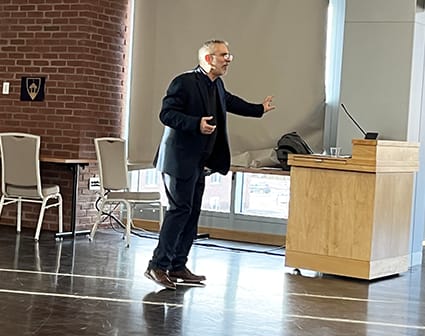
The speaker walks and talks to make a point. (photo by Allison Croce ’20)
He went on to share some Orthodox responses to date regarding changing views on homosexuality. He told about an important 2001 film Trembling before G-d showing “human beings struggling with being gay” in communities of Orthodox and Hasidic Jews. Greenberg said over the years since it came out, he took the film all over the world to start conversations, but people found it depressing.
Different from that, in a positive way as he sees it, since it shows people finally “being gay and happy,” has been an Israeli series The Holy Closet – he showed a gentle and smile-inspiring clip near the end of his talk – that follows experiences of religious Jews in Israel living their lives as gay people.
Change came slowly with such initiatives, the speaker acknowledged. Over decades, more gay people came out of the closet, and attitudes changed in notable ways. Some responses along the way felt like setbacks, he said, such as some Orthodox leaders defining homosexuality as demonic and unnatural desire. He talked about what he sees as the encouraging move away from an idea that therapy might change gay people, to a prevailing realization instead that this notion was not in touch with reality. A divide emerged between two groups of Orthodox leaders on this issue, he said, but eventually the notion gained more traction that “homosexuality might be simply part of the human condition” and rabbis might best and reasonably just place priority on being welcoming and kind and let “Elijah solve everything in the end of days.”
He told of a conversation with a more conservative Orthodox rabbi friend whom he asked to imagine what he would tell a 16-year old kid on how to live his life within the tradition. He asked his friend to imagine telling that youth that he will “never dance with someone you love, be held by someone you care about” if abiding by prevailing Orthodox norms about living a gay life. The story ended with the idea that perhaps this youth could be encouraged to keep “612 commandments out of 613 and live the best life you can live,” so that “when you get to Heaven, you will have a good argument.”
“The aim of my work is not to solve this problem, because it’s too deep – 2,000 years of a tradition is nothing to sneeze at,” Greenberg said.
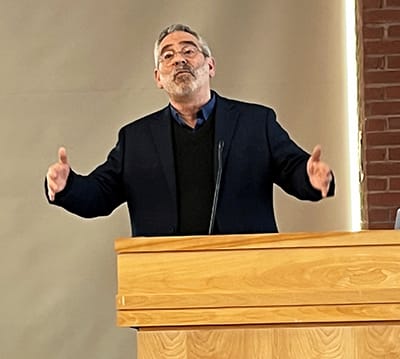
Rabbi Greenberg is animated in his presentation. (photo by Brother Tom Berube, S.S.E.)
A question-answer session followed the talk. Brother Tom Berube of the resident Edmundite community at Saint Michael’s said that the struggles within Orthodox Jewish tradition that the speaker described were “very much like the struggles that Catholic schools are going through.”
Greenberg said one gay former priest friend of his has told him that, “the moment they get that homosexuality is a non-pathological expression of an ordinary need for love and companionship, everything will change.” He said stories he hears seem to show that “This is a theological crisis in many high schools since the system cannot digest the human condition on this issue, and so loses credibility on others.” Yet, he said, if the religious “deciders” in whatever tradition do not solve that reality, they might find “no kids to teach who will think our religion is credible – so … better get busy.” He said he thinks Pope Francis is aware of all this, and that the Catholic Church or any tradition is not helped by being portrayed as cruel.
“Welcoming the stranger, even when crazily it is THAT stranger, saves lives,” he told his audience in conclusion. “Opening our hearts to what is unfamiliar and allowing ourselves not to be fearful of loss when we do – that’s a deep lesson of real inclusion” and “fulfillment of the Abrahamic vision of a tent open to all.”



